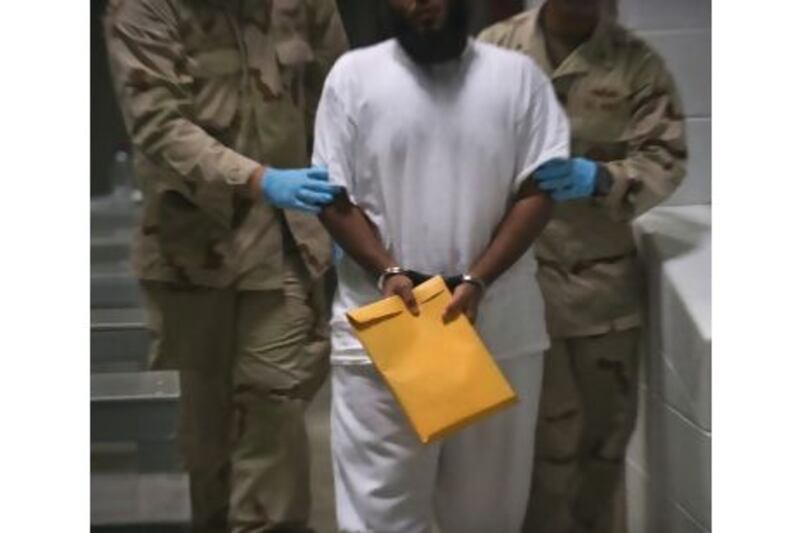WASHINGTON // President Barack Obama has signed an executive order that will create a formal system of indefinite detention for those held at the US military prison at Guantanamo Bay, Cuba, who continue to pose a significant threat to national security.
The administration also said it would start military commission trials for detainees.
The announcements on Monday, coming more than two years after Mr Obama promised in another executive order to close the detention centre, all but cements Guantanamo Bay's continuing role in US counterterrorism policy.
Administration officials said the president was still committed to closing the prison, although he made no mention of that goal in a short statement on Monday. The administration's original plans to create a detention centre in the United States and prosecute some detainees in federal court have all but collapsed in the face of bipartisan congressional opposition.
The executive order recognises the reality that some Guantanamo Bay detainees will remain in US custody for many years, if not for life. The new system allows them the prospect of successfully arguing in the future that they should be released because they do not pose a threat.
Mr Obama said: "Today, I am announcing several steps that broaden our ability to bring terrorists to justice, provide oversight for our actions and ensure the humane treatment of detainees."
But activists on either end of the debate over closing the prison cast the announcement as a reversal.
Anthony Romero, the executive director of the American Civil Liberties Union, said: "It is virtually impossible to imagine how one closes Guantanamo in light of this executive order. In a little over two years, the Obama administration has done a complete about-face."
Peter King, the Republican chairman of the House homeland security committee, said the order vindicated Mr Obama's predecessor. "I commend the Obama Administration for issuing this executive order. The bottom line is that it affirms the Bush Administration policy that our government has the right to detain dangerous terrorists until the cessation of hostilities."
The executive order applies to at least 48 of the 172 detainees who remain at Guantanamo Bay. A panel led by justice department lawyers determined that this group could not be prosecuted in military commissions or in federal court because evidentiary problems would hamper a trial. But intelligence assessments also concluded that these detainees remained a serious threat and could not be safely repatriated or resettled in a third country. The administration said it would hold reviews for detainees it plans to prosecute but has not charged.
The administration argues that it has the legal authority to continue to hold all of the detainees at Guantanamo Bay under the laws of war. Federal courts have backed that assertion, although they have found that some detainees should be released for a lack of evidence against them. The detainees will continue to have the right to petition the federal courts under the doctrine of habeas corpus.
Kate Martin, the director of the Centre for National Security Studies, said: "The new executive order doesn't change the legal authority for detention at all. It simply provides additional reviews for individuals who have been found by the habeas courts to be lawfully detained under the laws of war."
Under the order, each detainee will receive, within a year, a written, unclassified review of the factors that justify his continued incarceration. A government representative will be appointed to advocate on behalf of the detainees, who will have the right to hire private counsel, but not at the government's expense, the executive order says.
A periodic review board, composed of military, intelligence, homeland security, state and justice department officials, will consider each case. A detainee will have the right to appear before the board, introduce his own evidence and call witnesses "who are reasonably available", the order says.
Each detainee will receive a full review before officials every three years, and a paper review every six months.
But David Remes, a lawyer who represents 20 detainees, including 16 Yemenis, said he sees no substantive difference between the new system and the review process under the George W Bush administration, just "a new cast of characters" sitting on review boards.
*Washington Post






